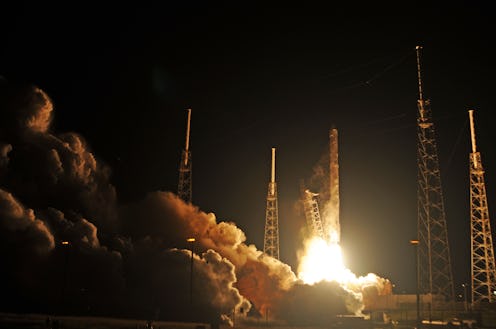News
Russian Craft Finally Delivered Supplies To Space
Supplies have been dwindling on the International Space Station for the last few weeks, which is pretty scary considering three astronauts are living there as part of a year-long mission — an expedition that is twice as long as normal. Fortunately, Progress M-28M, an unmanned Russian craft, finally reached the International Space Station Sunday with 2.5 metric tons of fuel, oxygen, water, food, and other supplies, according to the Associated Press. This was the fourth resupply attempt to the station and the only successful one so far. In April, another Progress launch ended in a system failure, and the Elon Musk SpaceX craft's rocket broke apart last week. It's still unclear what caused the explosion, but a Federal Aviation Administration investigation is underway, according to CNN.
Although NASA spokeswoman Stephanie Schierholz told The Washington Post the craft had plenty of supplies, a NASA presentation cited by the Post said the crew could run out of food by Sept. 5 if not resupplied. Further, this mission was crucial not only to resupply the three astronauts currently living at the station, but also to prepare for the addition of three more crew members who will be flying to the station at the end of the month, according to the Post.
The Russian unmanned rocket took off from Baikonur Cosmodrome in Kazakhstan on Friday, according to CNN. The crew joked about how great it was to receive the supplies in a tweet from the International Space Station:
NASA's William Gerstenmaier told CNN the crew was doing really well balancing their food supplies, but he said water was a different story. Gerstenmaier said one of the most important items that was lost in the SpaceX explosion was a piece of equipment that filters water. Without either more water or that piece of equipment, the entire station could only stay in orbit until late 2015, which wouldn't have been long enough for the "One-Year Crew" to finish their mission.
Mikhail Kornienko of Russia and NASA's Scott Kelly are part of NASA's One-Year Crew, and their mission hopes to explore how long-term space flight affects the human body. The station is approaching 100 days of orbit, according to The Planetary Society. The station is orbiting about 250 miles, or 400 kilometers, above Earth, according to CNN. It makes one full orbit every 90 minutes.
The one-year mission is important to NASA because the organization hopes to launch crewed missions to Mars at some point, according to Space.com. It would take at least 500 days for a crew to reach Mars, so knowing the potential health hazards of long-term space flight is a necessary step.
